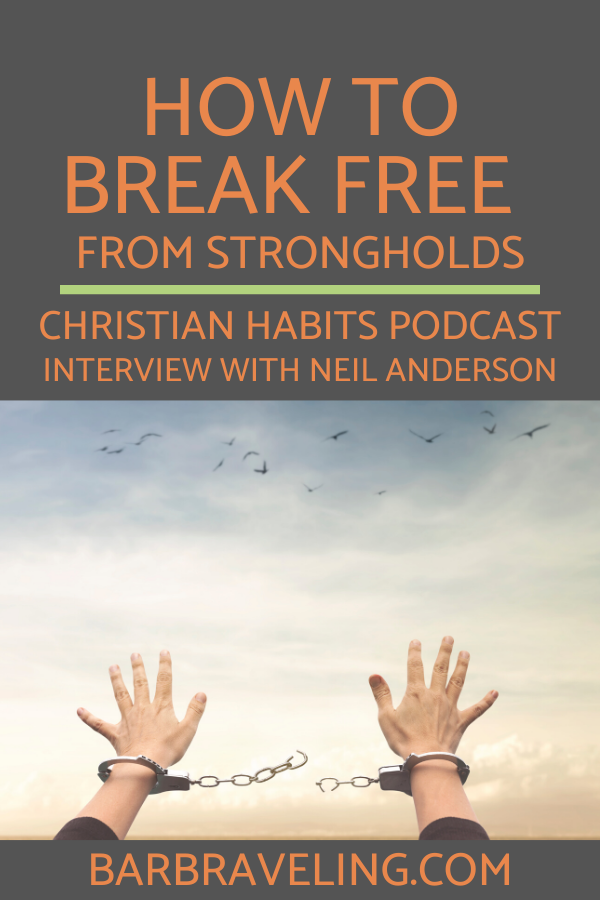Audio Player
Podcast: Play in new window | Download (Duration: 56:48 — 46.8MB) | Embed
On today’s episode of the Christian Habits Podcast, I interview Neil Anderson about gaining freedom in Christ. Neil Anderson is the author of many best-selling books including The Bondage Breaker and Victory Over the Darkness. He writes and speaks worldwide, helping people resolve personal and spiritual conflicts.

Here are just a few of the things we’ll be discussing on today’s podcast:
- What a stronghold is and how to break free from strongholds.
- The steps to freedom in Christ.
- Why it’s important to know who we are in Christ
- The difference between identifying ourselves as sinners saved by grace or saints who sin
- How unforgiveness affects us and why we need to forgive
- The importance of replacing lies with truth
- The importance of letting go of rebellion and submitting to God
- How the things we learn in childhood affect us.
Tips from Neil Anderson Podcast
Here are two tips I got from Neil’s podcast that I thought were super helpful:
- Go through the Steps to Freedom in Christ that are in his books. Neil said that if you want information, you should read the book. If you want transformation, do the Steps to Freedom in Christ with God because we need an encounter with God if we want transformation.
- Try reading through the “Who Am I in Christ” once a day for 30 days. Neil gave a great example on the podcast of a person who was transformed by doing this. Click here for a downloadable PDF: Who I Am in Christ
Resources We Talked About on the Podcast
- Victory Over the Darkness
- Freedom from Fear
- The Bondage Breaker
- Freedom from Addiction
- A Way of Escape: Freedom from Sexual Strongholds
- Managing Your Anger
- How to Truth Journal
Other Helpful Resources from Neil Anderson
How to Listen to the Podcast
- To listen or subscribe on Apple Podcasts: click here
- To listen or subscribe on Android: click here
- To listen or subscribe on Stitcher: click here
- To listen or subscribe on Google Play: click here
- To listen or subscribe on Spotify: click here

Hi Barb, I love your work and podcasts.
I was disappointed in this one. My son has battled mental illness since his teens. I think that Neals take on this is simplistic. If it was only a matter of asking for forgiveness or knowing who my son is in Christ, he would have been cured by now. It is only recently that I have totally accepted my son unconditionally without being angry at God for the suffering he has endured. This is a chemical problem. Any others out there who are dealing with similar issues, I sympathize and emphasize with what you are going thru. Although I wish and pray for an easy fix, I accept this for what it is and continue to love the God who loves me.
Hi Ky, I’m so sorry your son has had to deal with mental illness, and I’m not surprised you’ve had to work through emotions of anger with God as I know how hard it is to go through things like that. I also appreciate you bringing up your concerns with Neil’s material in such a gracious manner.
I know from experience that sometimes when you get interviewed you think later, Oh I should have said this or that. I know I’ve left out key things and haven’t been able to go back and change it because the interview was over. That’s why I emailed Neil after the interview to ask if he always recommends people go off their meds and just rely on God. It sounds like he also agrees that the steps don’t work for everyone.
Many have a mental illness that can’t be solved by the steps, and they’ll need to be on medication for the rest of their lives. (Neil mentioned that in his email reply to me.) That said, Neil is trying to help the ones who have been misdiagnosed, and he has lots of examples in his books of people who have found healing through going to God for help with the steps.
I also don’t think I did a very good job of managing time and getting to all seven steps in the interview, which may have made the 7 steps to freedom process sound much more simplistic than it really is. Neil’s second step in the 7 steps to freedom is to discover the lies you learned early in life and replace them with the truth. Going through all of the steps is a pretty involved process, so it’s more than simply knowing who you are in Christ and asking for forgiveness.
It’s simple, but it takes lots of time with God to go through them. In my own life of doing the things I talk about in my books, I’ve found fairly quick growth in a couple of areas, but in many areas it’s been a multi-year process. I won’t speak for Neil as I’m not sure how he feels on whether or not it can be a multi-year process to be set free from strongholds.
I think the medical community embraces the idea that stress, anger, etc, can affect us physically and be a factor in health problems, even serious ones. But I’ve often wondered if regular renewing of the mind could also help with things like mental illness. They’ve learned so much about the brain in recent years and how the thoughts we think create actual paths in the brain that can be changed by changing our thoughts. It seems like brain science is proving out the renewing of the mind the Bible talks about.
I’ve also had a loved one diagnosed with bipolar and did a little research. It sounds like cognitive therapy (which is a lot like the renewing of the mind – taking off lies and putting on truth) plays a key role in helping people with a bipolar diagnosis. So all that said, I agree with you that if it’s a true mental illness, the steps won’t cure it and the person would need to be on medication the rest of their lives. But I still think they could help. I’m a firm believer in using both a practical approach and spiritual approach to the problem. So for me, I would stay on the medication but also pursue God in renewing my mind diligently and trying the freedom steps to see if that helps. If it’s a misdiagnosis, all of that could help hugely.
Sorry about this long reply, but I wanted to take the time to think it all the way through, as I know the suffering you’ve gone through. If you’d like to visit about it, email me through the Start Here tab on my blog and we can set up a time to visit.
Thank you, Barb for your thoughtful reply. I’ve read it over several times.
I agree with you that renewing of the mind is the most powerful tool/exercise/ to change thinking patterns.
In my limited experience, it is such hard work for a mentally ill person to keep life together, that this can be very hard to do this as well. Perhaps with a therapist, they could keep on target.
My main thought, after listening to the podcast, was not to go back to simplistic solutions. I used to feel very guilty about what my son has to deal with…if I/he would have prayed more, believed more, the outcome would have been different…I don’t want to go back to that kind of thinking, because it is not true.
Thanks again for all the work you do and for taking the time to respond. I appreciate it very much.
Hi Ky, I would agree that it would be super hard for a mentally ill person to renew their mind on their own. Having a Christian therapist to help them would be a big plus, but even then they would have to be willing to try that as well. It would probably be more effective on days where their thinking was more clear than other days – if those days are available. It’s a hard situation, painful to be in and super painful to watch as well. It’s at these times we hope for heaven when we will all be healthy and whole.
Also, I would agree that it’s a good idea not to go back to “if only” thinking. God can bring good from any situation, and He’s not reliant on us managing life perfectly to make that happen (thankfully!). If you find yourself slipping back into that type of thinking, it may be helpful to do the regret questions from I Deserve a Donut or Renewing of the Mind Project or the RALLY study may also be helpful.